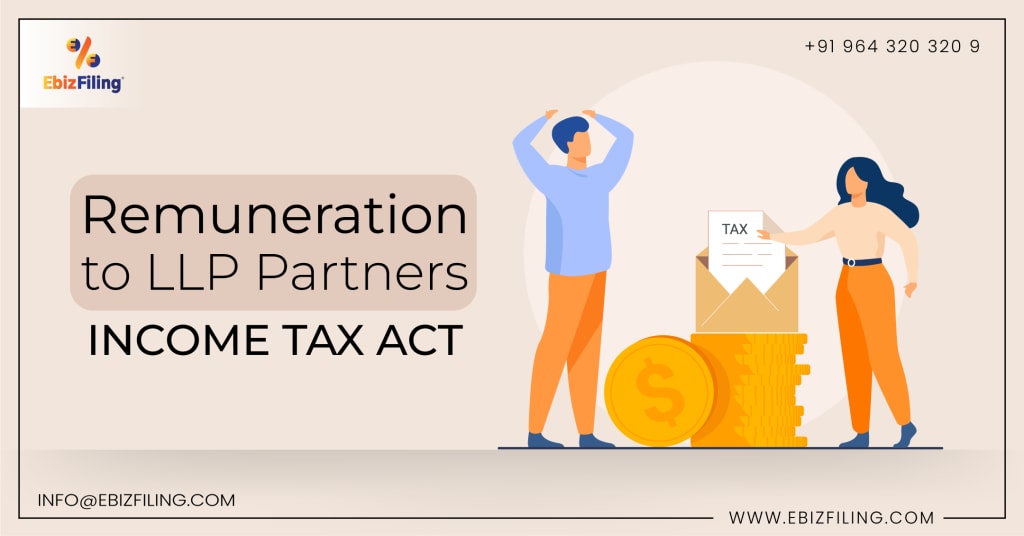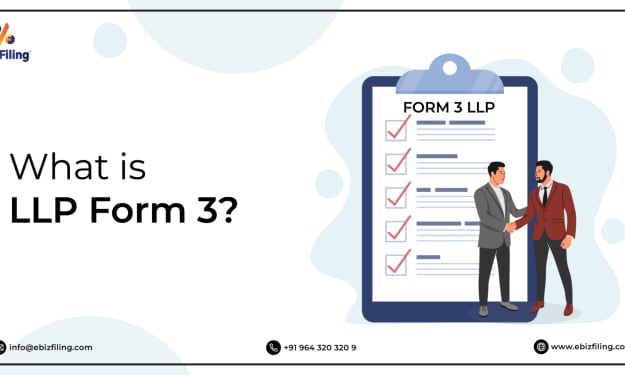A Guide to LLP Partner Remuneration - Income Tax Act
Everything you need to know about LLP Partner Remuneration, Eligibility Criteria, and the Maximum LLP Partner Remuneration Allowable by the Income Tax Department

Introduction
The Internal Revenue Service has released a number of comprehensive instructions on LLP (Limited Liability Partnership) partner compensation. While LLP compliance is straightforward, any LLP partner should be aware of the bare minimum of requirements. This article is primarily concerned with remuneration for LLP (Limited Liability Partnership) partners. Let's take a quick look at what LLP is. Before proceeding with the explanation of LLP Partner Remuneration.
What exactly is a Limited Liability Partnership (LLP)?
A limited liability partnership (LLP) is a type of partnership in which the members have limited liability. As a result, aspects of partnerships and businesses can be displayed. Each partner in an LLP is not responsible or liable for another partner's misbehavior or carelessness. A limited liability partnership (LLP) is a type of company organization that combines the advantages of partnerships and private limited companies. It is comprised of partners who have limited liability for the company.
Information about the term "Remuneration to Partners in LLP"
Because salary is such an important part of running a business, the LLP agreement specifies how it is paid. As a result, each partner will seek to maximize their investment return for their efforts, and partners must be aware of the many sorts of returns available in order to balance the agreement appropriately. The three most prevalent sorts of returns while working with an LLP are as follows.
Interest on Capital
This is a sort of payment that is directly related to the capital invested at the start of the company's development. It is unrelated to their present project. When the partnership was created, each partner must have contributed a piece or percentage of the total capital necessary, and their interest return is a fixed percentage of this amount. As a result, the interest they earn will be a percentage of the amount invested.
Profit-Sharing
This return becomes accessible when the LLP begins to produce a profit or becomes cash positive. This type of return takes into account both the amount of effort put in as well as the funds already invested. When the LLP begins to generate revenue, the profit is calculated and divided into pieces based on the quantity of work accomplished, and capital is introduced and dispersed among the partners as needed.
Remuneration
This word refers to everything from incentives and commissions to a partner's or employee's base salary. It is frequently granted to partners who work hard to help the LLP develop and succeed. It is a type of remuneration that is proportional to the work accomplished and has little to do with the initial monies spent in the partnership.
Maximum salary for LLP (Limited Liability Partnership) Partners
In the event of a loss, Rs. 1,50,000 or 90% of book profit, whichever is greater; 60% of book profit on the remaining of book profit.
Partners' annual interest rate shall not exceed 12%.
Partner Remuneration Eligibility Criteria
- The LLP Agreement specifies which partners get and which do not receive returns. Even if a partner is working, inactive, sleepy, active, or non-working, if a percentage of profit or interest is clearly defined in the LLP Agreement, they must be paid regardless of whether they deserve it or have done any work. However, the Income Tax Act limits the amount of compensation that an LLP can pay out. Furthermore, there is no provision in the LLP agreement for remuneration or a return to a time before the arrangement was in place.
The amount that is tax deductible under the Income Tax Act
- A deduction is only possible if the remuneration is received by a working partner or a person.
- Remuneration must be approved and documented in the LLP agreement.
- The amount owed cannot exceed the amounts given below.
- If a partner gets paid more than what is mentioned here, the additional amount is not deductible and must be paid in tax.
- The partners' salary is taxable as Business Income. Profit sharing is not stated in the same section as remuneration.
- The portion of profit returns earned by both working and non-working members is excluded under Section 10 (2A) of the Income Tax Act. Interest earned on capital invested by them is also considered Business Income.
- In terms of taxation, the interest earned by the LLP on partner draws is charged as business earnings and gains.
- A Limited Liability Partnership (LLP) is taxed similarly to a partnership. This means their earnings will be taxed at a 30% rate. LLPs, on the other hand, are ineligible for Section 44AD benefits, which allow businesses to avoid keeping records if their revenue is less than 8% of their total gross sales.
- The dividend distribution tax does not apply to an LLP (Limited Liability Partnership) because it does not distribute dividends like a corporation.
- Anything the partners receive in excess of this amount is taxed.
- The LLP Agreement must specify the exact interest rate and how it will be paid.
Amounts that are not eligible for a deduction
A deduction for the following amounts given to partners by a Limited Liability Partnership (LLP) is not allowed:
- Salary, bonus, commission, or payment of non-working partners.
- Payment of remuneration or interest to partners that is not in accordance with the requirements of the partnership agreement.
- If the partners are paid a salary or interest in accordance with the conditions of the partnership deed, but it is for a period before the date of the partnership deed.
- The interest given to partners exceeds 12% each year.
- The remuneration paid to partners conforms with the provisions of the partnership agreement, however it exceeds the following permissible limit:
On the first Rs. 3 lakhs of book profit or, in the event of a loss, the greater of Rs. 1,50,000 or 90% of book profit.
60% of the remaining book profit.
Note: 'The term 'book profit' refers to the net profit computed under 'Business or Profession,' plus the total amount of remuneration given or payable to all partners of the firm, if that amount has been subtracted from the net profit.
Conclusion
The designation of Partners or the terms incorporated into the LLP Agreement filed during LLP Registrations and later amended determine LLP partners' eligibility for returns and remuneration. As a result, when forming an LLP, the partners must carefully analyze each LLP member's designation and rights.
It should also be noted that, regardless of the LLP Agreement's remuneration requirements and restrictions, the taxability of returns, partner remuneration, and LLP profits is assessed in line with the Income Tax Act.
About the Creator
Ishita Ramani
EbizFiling.com is a motivated and progressive concept conceived by like –minded people, which helps small, medium and large businesses to fulfill all compliance requirements of Indian Laws.






Comments
There are no comments for this story
Be the first to respond and start the conversation.